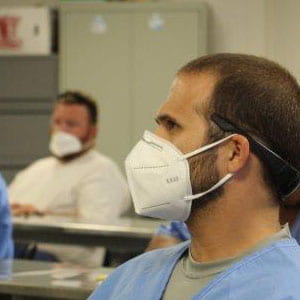FAQ
Why would we want to invest in education for people in prison?
First, 95 percent or more of all people in prison will be released eventually, coming home to our neighborhoods and communities. The better prepared they are to re-enter society and be employed, the safer we all are. Second, a robust and growing body of data establishes that the more education someone in prison is able to receive, the less likely they are to recidivate. Third, the returns on investment are high. According to a recent RAND report, every $1 invested in prison education generates $5 in economic returns for society. Together, these facts reveal that education is a potentially powerful tool to mitigate the systemic discrimination and de-humanization of mass incarceration.
Who will be eligible for this program?
For our demonstration cohort, we will focus on 20-25 students incarcerated at Richard J. Donovan Correctional Facility, who are currently completing an Associate’s Degree in Sociology through Southwestern College. These students would meet all eligibility requirements to apply to transfer to UC Irvine’s Sociology major, as well as meet a 3.4 GPA in all transferable coursework. Through this demonstration project, we will build the resources and infrastructure to extend this opportunity to additional cohorts of students to earn a wider variety of degrees, as well as to support other UC-community college-prison triangles.
Will people incarcerated with long sentences be part of this program?
Yes. Currently, each of the state’s 35 prisons provides opportunities for anyone who is incarcerated to apply to local community colleges and earn an associate’s degree. There are no eligibility restrictions based on crime or length of sentence, and we will not be imposing any such restrictions for students who meet state requirements for admission to a UC. Currently, there is only one BA-granting program in the state (run by California State University – Los Angeles at Lancaster State Prison); our model will greatly expand the BA-completion opportunities for anyone incarcerated in the state.
Why should people incarcerated with long or life sentences be eligible for this program?
First, California has “banned the box” on college admissions, so criminal records do not preclude access to education. Second, sentencing laws change every day, and prisoners with long or life sentences often have changing opportunities to seek and receive parole or reconsideration of their sentences. In the last 10 years, thousands of “lifers” have been released from prison in California due to state and federal sentencing changes rolling back “three strikes” sentences for non-violent convictions, life without parole sentences for juveniles, and changing parole requirements. If these former lifers have received an education in prison, they are more likely to succeed. Third, even for people who will not be released, a college education might make their time in prison more meaningful and useful, allowing them to teach and mentor the 95 percent of students who will be released, for instance.
Why should the University of California be involved in this initiative?
We are committed to advancing diversity, equity and inclusion, and fulfilling the California Master Plan’s vision of “allowing anyone from anywhere” the opportunity to enjoy the rewards of a college education. UCI LIFTED is investing in the futures of incarcerated people, transforming lives and communities. There are many examples of formerly incarcerated people whose education enabled them to make positive changes and achieve great accomplishments, including New York Times Magazine contributor Reginal Dwayne Betts, and Earlonne Woods and Antwan Williams, hosts of the award-winning “Ear Hustle” podcast.
Closer to home, the department of Criminology, Law & Society, a key partner in this initiative, is the alma mater of two formerly incarcerated California State University professors. A UC degree in particular opens doors to graduate degree opportunities in humanities, social sciences and other fields, allowing formerly incarcerated people to assume leadership roles, reducing the stigma associated with having a criminal record. Through the LIFTED demonstration project, we will build the resources and infrastructure to extend this opportunity to additional students for a wider variety of degrees, and to support other UC-community college-prison pipelines.
How will this program be funded?
The primary financial aid mechanism for student tuition is the University of California System’s Blue and Gold Opportunity Plan. Initial program development seed grants have been provided by the Michelson Foundation, Google, and individual contributions. We will continue our fundraising efforts through additional grants and private donations to underwrite program development costs, such as support staff salaries, textbook and supply costs, and faculty transportation to and from the prison.
Will formerly incarcerated individuals be at our school?
Formerly incarcerated individuals are already at all UC campuses. The Underground Scholars Initiative, founded at UC Berkeley, has chapters across the UC campuses to support formerly incarcerated students on campus. Students who earn their A.A. and are admitted to the UCs while in prison will be eligible to continue their education on campus, if they are released from prison, just like any other California resident who matriculates to a UC campus from community college

